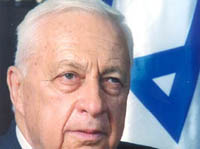Israeli elections end with record-low turnout
Israel held parliamentary elections yesterday, which became the 17th elections during 58 years of the country’s history. The people showed little interest in the process, but yesterday’s political events became a landmark moment for the State of Israel. The country was making a choice between the continuation of the long-standing occupation of Palestinian lands and the daring evacuation of Jewish settlements from the West Bank of Jordan.

The right-wing parties, which include Likud, Our Home Israel, Ihud Leumi bloc, stand strongly against the evacuation of the Jewish settlements. The ideology of the leftist parties of Israel, such as Avoda, is based on the principle of co-existence between the states of Israel and Palestine.
In addition to traditional right and left-wing Israeli parties, the new centrist party, Kadima, took part in yesterday’s voting as well. Kadima has biggest chances to win the election, specialists say. The party was founded in November of 2005 by Ariel Sharon, who suffered a massive stroke in the beginning of the current year and thus was unable to participate in the election. Kadima is being currently chaired by acting Prime Minister of Israel Ehud Olmert, who promised to continue the evacuation of Jewish settlements from the West Bank of Jordan.
A low turnout became the main problem of yesterday's election in Israel. About 87 percent of people came to the polls in 1949 at the first-ever parliamentary elections in Israel. The turnout has been decreasing slowly but surely since that time. Only 69 percent of Israeli nationals cast their votes at the elections of 2003. The Central Electoral Committee of Israel was reporting an extremely low turnout yesterday: only 39 percent of people had fulfilled their civil duty by 4. p.m. local time.
The day of elections was declared a day off in Israel, which gave quite an uplifting feeling to common people. 8,280 poll stations opened in Israel nationwide at 7 o’clock in the morning. Many people preferred to go to the polls in the morning so that they could spend the rest of the day resting with their families and friends.
Groups of young people would come to the polls, vote and then go to the nearest cafes and bars to celebrate the ‘holiday of democracy.’ Israeli students were very happy to have an extra day off from school. Cafes, clubs and other entertaining institutions were doing their best to attract clients. The Jerusalem Zoo, for example, organized an alternative animal election and offered the visitors to vote for the best animal in the zoo.
Israeli politicians also preferred to vote in the morning. Ehud Olmert was the first to do it. Kadima leader Olmert cast his vote before the poll stations were opened, apparently for safety reasons. Likud’s leader Benjamin Netanyahu voted in Jerusalem. The leader of the left-wing party Avoda, Amir Peres, came to a poll in his hometown situated not very far from the Gaza Strip in Israel’s south.
Israeli special services toughened security measures in the country on the day of the voting. The services received 85 messages about possible terrorist attacks in Israel. Palestinian extremist organizations believe that it is especially “prestigious” to conduct terrorist attacks during election.
Vremya Novostei
Translated by Dmitry Sudakov
Discuss this article on Pravda.Ru English Forum
Subscribe to Pravda.Ru Telegram channel, Facebook, RSS!


